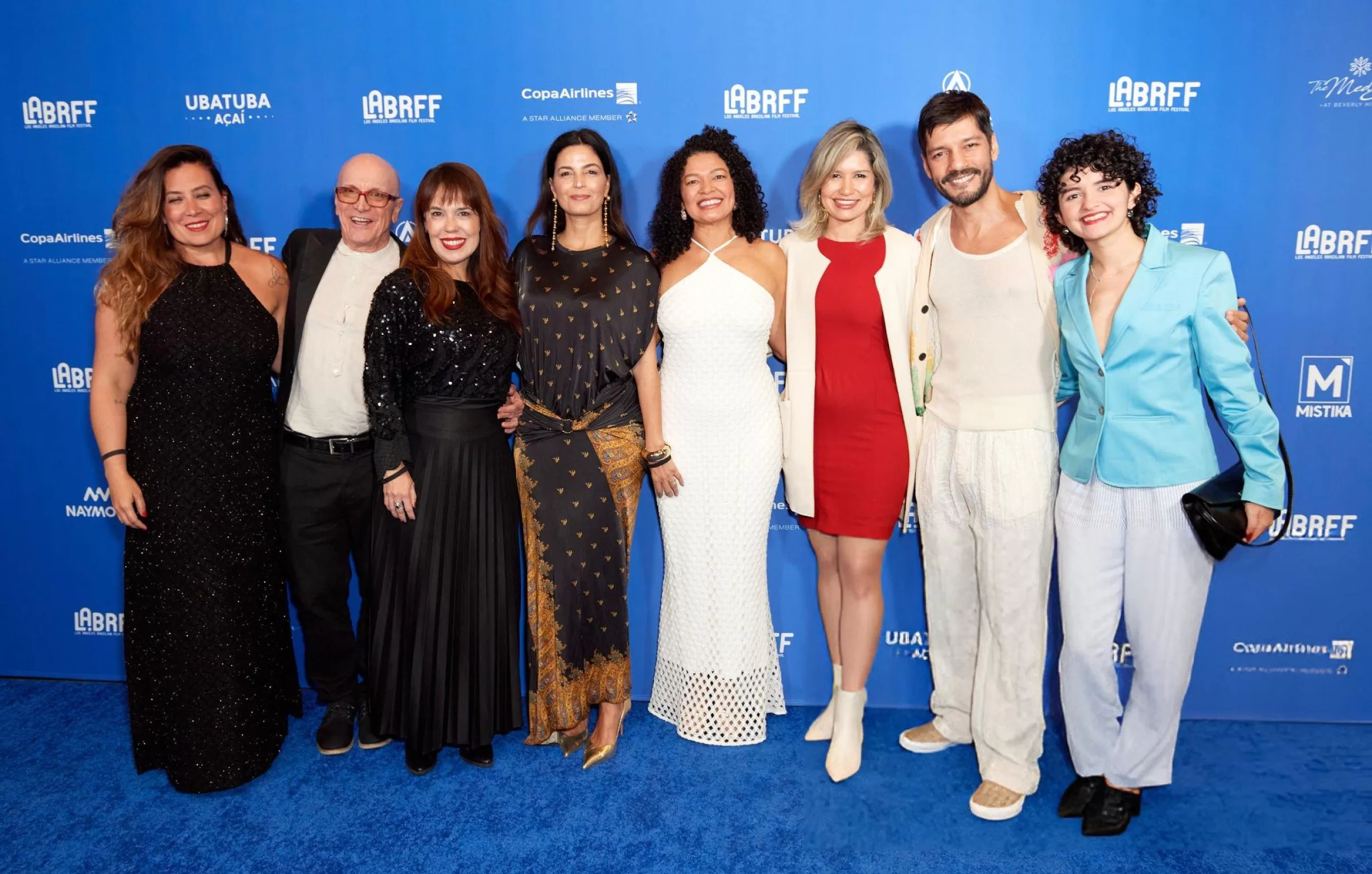The 17th Los Angeles Brazilian Film Festival (LABRFF) opened with a remarkable adaptation of the Brazilian literary classic Grande Sertão: Veredas, retitled in English as Great Sertão: Veredas. Directed by the acclaimed filmmaker Guel Arraes, this modernized version of João Guimarães Rosa’s iconic novel was the centerpiece of a star-studded premiere event. The adaptation shifts the narrative from Brazil’s rural backlands to a contemporary favela setting, brilliantly reimagining themes of love, betrayal, and the blurred lines between morality and vice.
Great Sertao Premiere at the Culver Theater
The premiere of Great Sertão: Veredas took place at the iconic Culver Theater in Los Angeles, newly renovated to provide a stunning backdrop for LABRFF’s opening night. With a red carpet event and a cocktail party to set the scene, celebrities like Nicola Siri, Emanuelle Araújo, Daniel Satti, Juliana Baroni, and Marcos Frota were in attendance, mingling and celebrating the film’s debut.
The atmosphere was filled with anticipation, and audience reactions were electric. As the credits rolled, the room erupted in applause, with many praising the film’s powerful storytelling, vivid cinematography, and the riveting performance of Silvero Pereira as Riobaldo.
The adaptation of Great Sertão: Veredas resonated strongly with fans of the novel and new viewers alike. On social media, reactions were overwhelmingly positive, with viewers commending the film’s authentic depiction of life in the favelas and its exploration of complex moral issues. Many hailed the film as a must-see for fans of Brazilian cinema, while others praised Guel Arraes for his bold reimagining of the classic story.
Viewers appreciated the film’s exploration of contemporary issues such as loyalty, betrayal, and the blurred lines of right and wrong. The fresh interpretation of the novel was especially celebrated, as it offered a meaningful bridge between Brazilian literature and modern urban life.
Great Sertao Summary
Arraes’ adaptation transposes the 19th-century Brazilian sertão (backlands) to a sprawling urban favela, bringing a dynamic, contemporary lens to the story. This setting, marked by its mix of poverty, resilience, and community spirit, reflects many of the same moral complexities depicted in Rosa’s original work, such as loyalty, power struggles, and the shades of good and evil.
At the heart of Great Sertão: Veredas is Riobaldo, a man whose journey intertwines with themes of love, loyalty, and redemption. As he grapples with his forbidden love for Diadorim and his former life as a gang leader, Riobaldo’s narrative arc unfolds with rich emotional depth, exploring the psychological and moral challenges that resonate universally.
Great Sertao Cast And Character Breakdown
Each actor in Great Sertão: Veredas breathes life into complex characters, shaping the film’s unique blend of action, romance, and moral contemplation.
Silvero Pereira’s portrayal of Riobaldo is powerful, capturing the character’s intense internal struggle. As a former gang leader now torn between duty and love, Riobaldo’s character embodies conflicting loyalties and a desire for redemption. Pereira’s performance is layered with raw emotion and intense nuance, making Riobaldo’s journey both relatable and deeply compelling. Luisa Arraes shines as Diadorim, a character who defies traditional gender roles and challenges societal norms. Diadorim’s relationship with Riobaldo introduces tension and tragedy, and Arraes skillfully captures Diadorim’s strength, resilience, and vulnerability, making her a striking figure in this complex tale of love and identity.
As Riobaldo’s steadfast friend, Reinaldo (played by Caio Blat) serves as a grounding force and moral compass within the story. Blat’s performance brings humor, warmth, and earnestness, providing moments of emotional respite amid the film’s intense storyline. Reinaldo’s loyalty and wisdom play a critical role in Riobaldo’s journey, and Blat’s portrayal balances lightheartedness with genuine depth.
Rodrigo Lombardi’s portrayal of Joca Ramiro, a powerful police figure in the favela, is both commanding and complex. Ramiro’s authority comes with layers of ambiguity, as his relationship with Riobaldo is marked by tension, rivalry, and unspoken truths. Lombardi’s portrayal adds gravitas to the film, making Ramiro’s presence an intriguing counterpoint to Riobaldo’s quest for meaning. Luis Miranda excels as Zé Bebelo, the feared bandit leader whose ruthless ambitions drive much of the conflict in Great Sertão: Veredas. Miranda’s performance captures the character’s merciless nature, yet also reveals Zé Bebelo’s cunning and intelligence, adding a layer of unpredictability to the story’s unfolding drama.
Eduardo Sterblitch plays Hermógenes, a character whose actions and motivations fuel many of the film’s central conflicts. His loyalty to Zé Bebelo and his own moral struggles make Hermógenes both complex and unpredictable, with Sterblitch delivering a performance that keeps audiences captivated. Mariana Nunes brings warmth to the character of Otacília, Riobaldo’s childhood love. Otacília’s presence is a reminder of what Riobaldo has lost in his pursuit of power, and Nunes’ portrayal is tender and evocative, adding a rich emotional layer to the narrative.
Great Setao Review and Reactions
Bringing Great Sertão: Veredas to life was no small feat, and director Guel Arraes shared his insights on the challenges and rewards of adapting such a revered literary work. With the goal of remaining faithful to the essence of Rosa’s novel, Arraes balanced the story’s thematic complexity with a modern-day relevance, choosing to set it in a favela to reflect the social and economic realities of contemporary Brazil.
Arraes emphasized his commitment to capturing the novel’s philosophical undertones while making the film accessible to a modern audience. His vision successfully bridges past and present, creating a film that speaks to both longstanding fans of the novel and new audiences.
The 17th Los Angeles Brazilian Film Festival kicked off with a powerful cinematic adaptation in Great Sertão: Veredas, bringing Brazilian culture and storytelling to the forefront. With a compelling plot, nuanced characters, and a brilliant reimagining of Rosa’s literary classic, the film sets a high bar for the festival and for Brazilian cinema at large. As LABRFF continues, audiences can look forward to more groundbreaking films that showcase the vibrancy, diversity, and emotional depth of Brazilian cinema.





